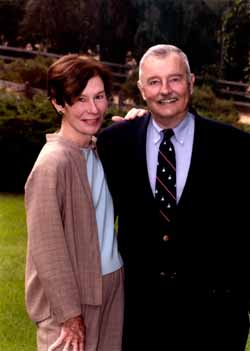 SARAH and JAMES, Med 1964, FRIES met as undergraduate classmates at Stanford University and took their honeymoon driving East from Malibu to Baltimore where Jim entered medical school in 1960; he continued as house officer in medicine and fellow in rheumatology at Hopkins, and Sarah worked with handicapped children on Rutland Avenue for eight years. Their children Elizabeth (1963-2005) and Gregory (1965- ) were born at Hopkins. Sarah and Jim returned to Stanford in 1968 where Jim was senior resident and then clinical scholar of the Carnegie and Commonwealth Foundations.
SARAH and JAMES, Med 1964, FRIES met as undergraduate classmates at Stanford University and took their honeymoon driving East from Malibu to Baltimore where Jim entered medical school in 1960; he continued as house officer in medicine and fellow in rheumatology at Hopkins, and Sarah worked with handicapped children on Rutland Avenue for eight years. Their children Elizabeth (1963-2005) and Gregory (1965- ) were born at Hopkins. Sarah and Jim returned to Stanford in 1968 where Jim was senior resident and then clinical scholar of the Carnegie and Commonwealth Foundations.
Their academic passions are to improve health outcomes at the personal, regional, national, and international levels through postponement of chronic disease, encouragement of self-management, changing the paradigm underlying healthy aging, and developing strategies for chronic illness management. They have sought to be “agents of change” and have endowed this professorship to support others who share their purpose of evidence-based improvement in health, health care, and health outcomes.
Dr. Fries is professor of medicine at Stanford University. He is internationally recognized as a leader in healthy aging, in long-term outcome assessment, in self-management strategies, in evaluation of behavioral interventions by randomized trials, and in managing longitudinal clinical data collection and analysis projects. He has published more than 300 scientific articles and 11 books, including the self-management guides Take Care of Yourself and Living Well.
In 1980, Dr. Fries developed the “Compression of Morbidity” hypothesis, which provided the conceptual foundation for healthy aging programs. The “Compression of Morbidity” hypothesis holds that primary preventive factors have a greater effect upon morbidity than upon mortality, and that chronic diseases with onset later in life will be present for a shorter period of time, decreasing lifetime morbidity. Dr. Fries’ discussions of this subject have included two lectures at the Nobel Forum and two keynote addresses to the Institute of Medicine. At Hopkins he gave the keynote address to the Johns Hopkins Community of Scholars at the Centennial and subsequently the Mason Lord Lecture on Aging.
Dr. Fries established the national arthritis data resource, ARAMIS, for the NIH in 1975 and has directed it through more than 1,000 publications and many major contributions for more than 35 years. His NIH roadmap PROMIS program is providing measures for better assessment of health outcomes. Dr. Fries plays an important role in The Health Project, which encourages well-evaluated worksite, community, and senior health enhancement programs.
Sarah and Jim founded Healthtrac, Inc. in 1984 as a tailored health-improvement program and subsequently the model for current Medicare initiatives. Sarah served as president and CEO of the organization for 16 successful and productive years, reaching several million people. She is president of the Fries Foundation, which annually presents the Fries Prize for Improving Health to an individual judged by the prize jury to have made the greatest contribution to human health, and The Elizabeth Fries Health Education Award given to the foremost health educator.
Sarah and Jim live with three horses, one dog, and a barn cat in Woodside, California. Jim has run the Boston Marathon and climbed (6) or attempted to climb (1) the highest mountain on each continent. Sarah, before her melanoma, climbed Kilimanjaro and a dozen Colorado 14ers (mountain peaks exceeding 14,000 feet) with Jim, rode with the zebras in Botswana, and visited the North Pole. In recent years, despite residual disability from malignant melanoma with multiple brain metastases, she voyaged around the world, almost to the North Pole, and to Antarctica. Her disease longevity and life quality have been variously attributed to spirit, support, and science.
